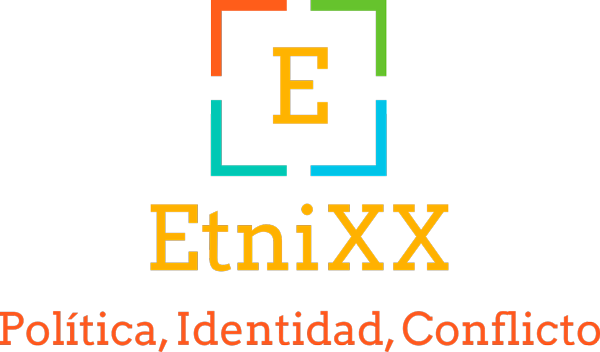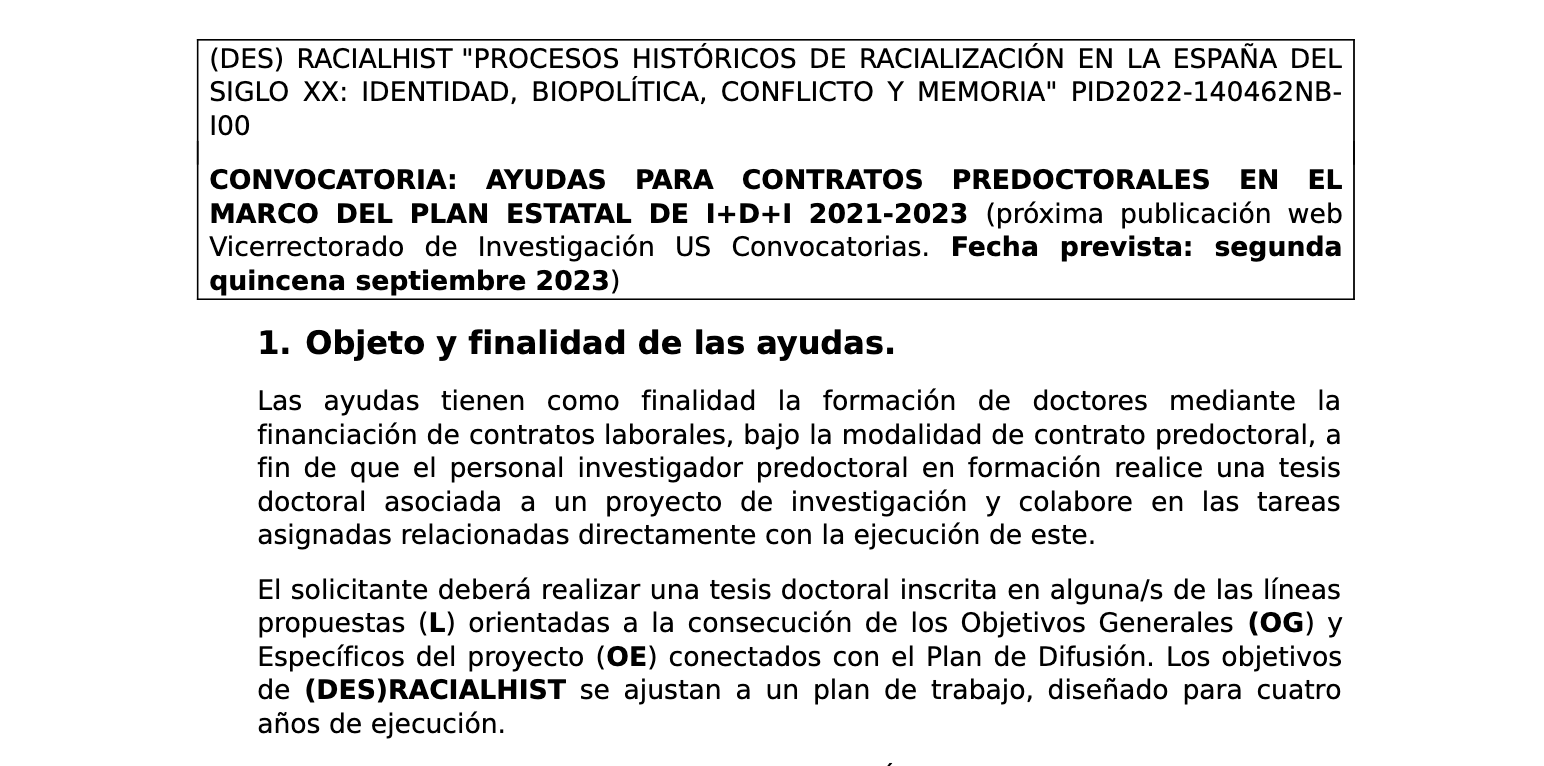Last July, the provisional resolution of the 2022 call for "Knowledge Generation Projects" grants and actions for predoctoral researchers associated with these projects was published, and once again, we have reasons for collective congratulations. The proposal (DES) RACIALHIST - "HISTORICAL PROCESSES OF RACIALIZATION IN 20TH CENTURY SPAIN: IDENTITY, BIOPOLITICS, CONFLICT, AND MEMORY," led by our Principal Investigators, Carolina García Sanz (PI1) and María Sierra (PI2), has received the full amount of requested funding (€122,500.00 indirect costs/ €98,000.00 direct costs), in addition to the award of a predoctoral contract, the application period for which will open very soon. Those interested in applying for it can find more information here.
(DES)RACIALHIST explores the historical significance of the construction of the racial difference within the public space and collective imaginaries in 20th century Spain. Its general objectives and lines of work focus on the cultural production of race as a category, intertwined with gender and class, addressing carefully institutional and/or expert initiatives and social agency at different levels.
(DES)RACIALHIST interest in the study of identity processes, and their relationship with historical practices and memorialization, also implies analyzing the agency of the social groups challenged by racializing representations. The relations between identity, race and memory open a research area to be fielded by Spanish historians in this vein for a long time. Therefore, (DES)RACIALHIST aims to fill a double research gap: firstly, by addressing the historical study of racism in contemporary Spain and, secondly, assessing the construction of the racial difference as a key factor for understanding social hierarchy, identity creation, violence, and political conflict in Spain throughout the 20th century. To achieve this, the project deals with discourses and practices that have transnationally constructed and naturalized racial differences, revealing the history of a wide range of social processes and their chronologies: in first place, it will attend to political agents, scientific experts and cultural creators, with the capacity to elaborate and disseminate messages of racial discrimination; in second place, it will develop working hypotheses within a "long" 20th century rooted in 19th century scientific racialization and extended, by an infinity of forms of racializing practices, to the 21st century both in Spain and the western world. Although the Francoism sets the main pattern for the analysis, (DES)RACIALHIST is open and attentive to previous and subsequent historical stages, which will allow us to assess critically trends of continuity and change.
The methodology of (DES)RACIALHIST, with its flexible and integrative use of biopolitics, embraces an analytical framework that contributes to the approaches inherent in the history of political violence in Spain. It combines critical tools from racial studies with other historiographical perspectives that have significant deconstructive potential, particularly the gender perspective. Moreover, it incorporates research questions about our shared past that are also explored by other disciplines concerned with the study of human difference and social inequality. This interdisciplinary and international approach is evident in the composition of the research and working teams.
In addition to the theoretical and methodological expertise accumulated in cultural and political history by the two Principal Investigators (Carolina García Sanz and María Sierra, University of Seville), the history of political violence and repression (Carmen Fernández, Leandro Álvarez Rey, University of Seville, and Jennifer Illuzzi, Providence College), colonialism and Americanism (Jean-Frédéric Schaub, Director of Studies, EHESS), gender history (Alba Martínez, University of Leeds-UCM, Ester García Moscardó, University of Valencia, Cristina de Pedro Álvarez, UCM, and Begoña Barrera, University of Seville), oral history (Anabel Carballo, University of Barcelona), (DES)RACIALHIST integrates approaches and working methods from Sociology and Political Science (Héctor Romero, UNED); Literature and Arabic Studies (Rocío Velasco, University of Extremadura), Cultural Heritage (Tamara West, Liverpool University), Daniela Flesler (Stony Brook University), African, Black, and Caribbean Studies (Ana Isabel Simón Alegre, Adelphi University), Hebrew Studies (with external collaboration from Pablo Bornstein, UNA4CAREER-Marie Skłodowska-Curie, UCM), and Anthropology (Cristina Cruces, University of Seville).
(DE)RACIALHIST focuses on a fundamental historical issue to understand contemporary problems, such as the relationships between the cultural production of ignorance and discourses that incite racial hatred, leading to social practices that limit rights. Due to its theme, approaches, and lines of work, (DE)RACIALHIST connects the generation of scientific knowledge with the following Sustainable Development Goals of the 2030 Agenda.
The results of (DE)RACIALHIST, driven by its commitment to excellence and high scientific-technical impact, are as follows:
- Advancing scientific knowledge based on evidence obtained from previous actions in EtniXX (HAR2015-64744-P; PID2019-105741GB-I00).
- Innovating in the Spanish historiographical field by systematically addressing a question that has not received the same attention as in other European historiographies.
- Contributing to a paradigm rooted in complexity, fostering dialogue with other disciplines, notably Sociology, Political Science, Anthropology, Cultural and Philological Studies, and promoting interdisciplinary network research through research teams in Spanish and international academic institutions and think tanks.
- Collaborating with other research groups and projects focused on political and social identities and collective violence processes in 20th-century Spain through network activities aimed at exchanging knowledge and experiences on common topics (VOICES Network). There is also an aspiration to collaborate with teams specialized in History of Medicine and Gender Studies.
- Exploring the European research agenda.
(DE)RACIALHIST directly addresses two major goals of the 2030 Agenda: reducing discrimination and gender inequality. It focuses on victims of multiple discrimination in Spain, particularly women belonging to racialized minorities. The expected results of our proposal aim to transform perceptions of current issues that fuel public debate on racism and discourse of fear or hatred towards immigrants. To achieve this, (DE)RACIALHIST will seek to generate knowledge with the potential to impact on policymaking, keeping the cooperation already initiated with activists and organizations fighting discrimination in Spain, with actions oriented towards working with young people in the educational field.
KEYWORDS: RACIALIZATION PROCESSES, DISCOURSES AND PRACTICES, IDENTITIES, BIOPOLITICS, CONFLICT, VIOLENCE, MEMORY, 20TH CENTURY SPAIN



